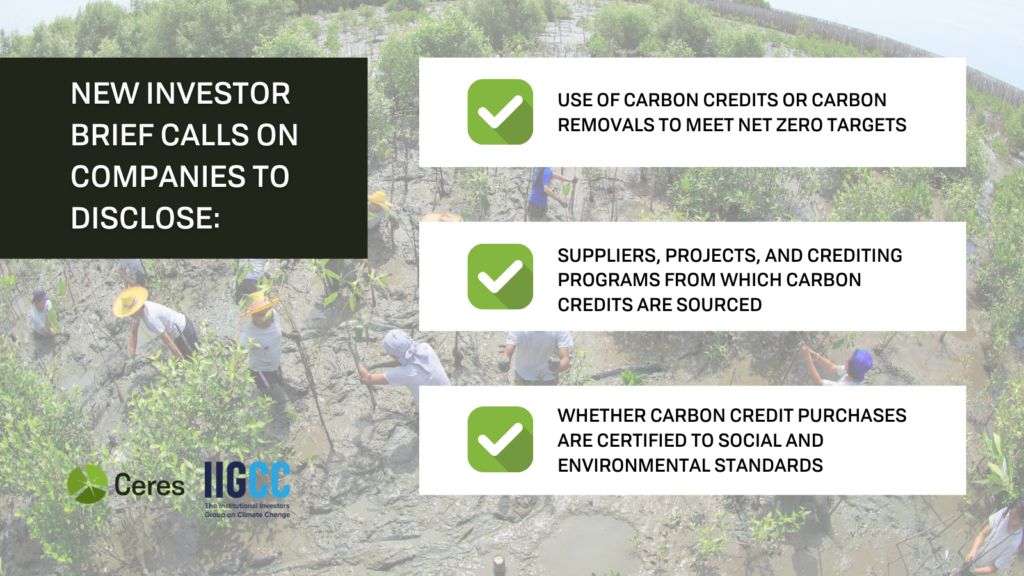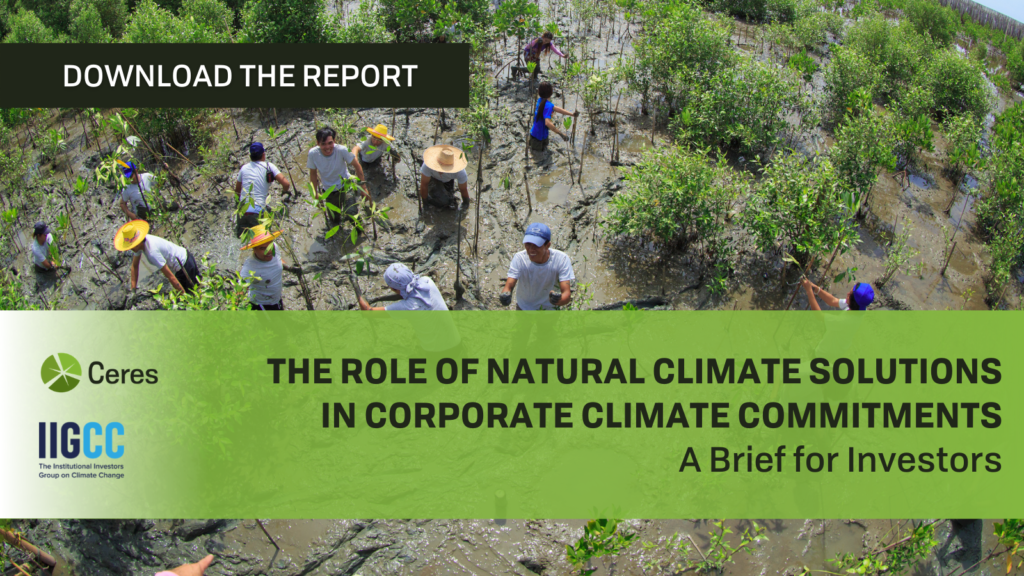Last updated on February 12th, 2024
As net-zero commitments become the new standard for investors and companies, Ceres and the Institutional Investors Group on Climate Change (IIGCC) released a new first-of-its-kind engagement tool for investors to spur meaningful dialogue with companies on the role and use of natural climate solutions in delivering on those commitments. Natural climate solutions, such as forest protection or reforestation, are a common component of many corporate net-zero action plans, often used to offset companies’ greenhouse gas emissions.
New research shows that use of carbon credits increased by 81% in quarter 1 of 2021, with credits from natural climate solutions such as forest protection comprising the greatest share at 20.0 million credits retired. Much of this increase was driven by corporate demand to offset emissions. However, offsetting has long been controversial, and a lack of detail in companies’ commitments has made it difficult for investors to distinguish legitimate climate action from greenwashing.
In the face of this, The Role of Natural Climate Solutions in Corporate Climate Commitments: A Brief for Investors aims to help investors understand the role and use of natural climate solutions in climate commitments and provides clear guidance on how to facilitate engagements with portfolio companies on this issue. It also lays out expectations for climate disclosures — calling for transparency in critical steps along the way to net zero.
“Our new brief introduces investors to what we call the ‘missing middle ground’ in the debate over natural climate solutions and offsetting, helping them make sense of the effective and appropriate use of these solutions in corporate climate action plans. We hope to empower investors to help companies avoid actions that pose climate-related and reputational risks to their portfolios and instead, help them make investments that deliver on their projected promises to cut emissions,” said Dr. Meryl Richards, director of research for food and forests at Ceres and lead author of the brief.
Projections show that without natural climate solutions, emissions will not be reduced enough to reach the 1.5 degree C warming threshold that is required to avoid the worst impacts of climate change. But when used to offset emissions from companies in high-emitting sectors, such strategies attract greater scrutiny. Recent reports have called into question the value of nature-based carbon credits, creating growing concern from investors, NGOs, journalists, and other climate watchdogs that some NCS projects may inflate the projected emissions reductions that they promise, or result in harmful outcomes for communities.
The brief examines the appropriate use of natural climate solutions in corporate climate strategies, explores the investor’s perspective on the risks and opportunities associated with the use of natural climate solutions, and introduces key points of engagement for investors to guide company’s usage of natural climate solutions.

It specifically calls on companies to disclose:
- Short-, medium-, and long-term targets that are aligned with a 1.5 C pathway,
- A credible transition plan for achieving targets,
- How much of the target will be met through the use of carbon credits or carbon removals,
- The GHG crediting programs, suppliers, and projects from which they source carbon credits, and
- Whether their carbon credit purchases are certified under a social and environmental standard.
The brief also calls for guardrails to determine the appropriate use of natural climate solutions by companies, to ensure that they raise the ambition of their climate commitments, provide credible and scientifically-sound climate change mitigation benefits, and contribute social and environmental benefits to the communities where projects are located.
About Ceres
Ceres is a nonprofit organization working with the most influential capital market leaders to solve the world’s greatest sustainability challenges. Through our powerful networks and global collaborations of investors, companies and nonprofits, we drive action and inspire equitable market-based and policy solutions throughout the economy to build a just and sustainable future. For more information, visit ceres.org and follow @CeresNews.
Miranda Cawley is the communications manager for the Water, Food and Forests Program at Ceres.

